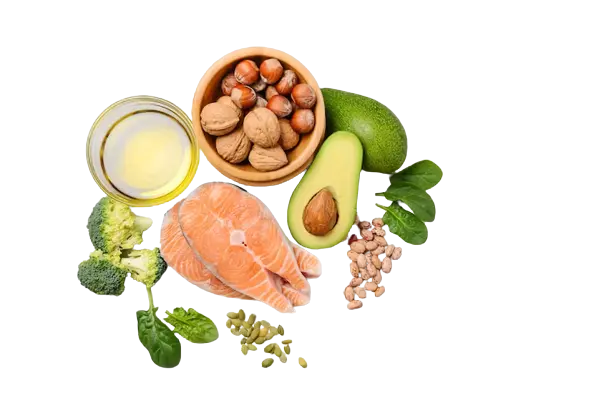- Explore the Benefits of Omega-3
- Omega-3 Rich Food Sources
- What Are Omega-3 Fatty Acids?


A common and essential term bounced around in the health and wellness industry is omega-3 fatty acids and how they are beneficial for your overall health. Omega-3 are nutrients that your body cannot produce on its own and you can acquire it only through different food resources. Omega-3 fatty acids are essential and help in maintaining brain health, and heart health, protecting you against chronic illnesses, and reducing inflammation. There are very few nutrients that have been studied as extensively as omega-3 fatty acids.
Omega-3 fatty acids contain multiple benefits that are necessary to sustain a human body and hence it is essential that you consume a holistic diet that includes omega-3-rich foods. In this, we cover everything about the health benefits of omega-3 fatty acids but before that let us discuss the types of omega-3-rich food sources.
Omega-3 fatty acids are unsaturated fats that are attained from certain food sources. The 3 main types of omega-3 fatty acids are:
ALA is known to be mainly found in plant-based oils such as flaxseeds, soybean, as well as canola oil. ALA is an essential omega-3 fatty acid as it is not produced by your body but is attained through different food resources. The human body is capable of converting ALA into EPA and DHA but in very small quantities, which is why it is essential to gain these omega-3 fatty acids through supplements.
There are no fixed recommended amounts of omega-3 fatty acids as per health experts and nutritionists. However, ALA is recommended as per the limits mentioned below
We have mentioned some scientific benefits of omega-3 fatty acids that you can acquire from various food items in your kitchen.
We all know that individuals are incapable of producing Omega-3 fatty acids within their bodies and have to consume them through vegetarian and non-vegetarian food sources. There are multiple advantages of omega-3 supplements that affect your overall health and fitness and we have listed down below food sources to include in your daily diet to achieve your omega-3 goals.
| Vegetarian Food Sources | Non-Vegetarian Food Sources |
| Algae Oil | Mackerel |
| Canola Oil | Salmon |
| Chia Seeds | Oysters |
| Edamame | Sardines |
| Walnuts | Shrimp |
| Flax Seeds | Tuna |
| Soyabean Oil | Trout |
Omega-3 fatty acids have immense benefits for individuals across all age groups. It is essential for adults as well as infants in order to attain healthy brain development and avoid cognitive illnesses. If you are working towards better mental health, you must consider including omega-3-rich food in your diet on a regular basis as it will help you regulate restlessness, and fight depression and anxiety. It is an excellent source to reduce the symptoms of ADHD, individuals who suffer from ADHD can benefit highly from Omega-3 supplements. Omega-3 benefits are immense and can have a positive impact on your mind and body.
Omega-3 fatty acids are also known as "healthy fats" that are not produced by our bodies. We need external food sources in order to fulfill our need for Omega-3 fatty acids. There are 3 main types of Omega-3 fatty acids that are EPA, DHA, and ALA. Wherein, ALA is found in plants whereas EPA and DHA can be consumed via seafood. Omega-3 fatty acids are essential to maintain a healthy heart, brain, skin, and more. It also protects you from age-related illnesses like dementia, memory loss, and more.
Yes, you can intake omega-3 fatty acids on a daily basis within a given quantity for a healthy body. We have mentioned above the intake quantities as per your age and gender.
The vegetables that are rich in omega-3 fatty acids are:
4.4
Rated by 2629 customers
Select Your Rating
Let us know about your experience or any feedback that might help us serve you better in future.


Simran is an insurance expert with more than 4 years of experience in the industry. An expert with previous experience in BFSI, Ed-tech, and insurance, she proactively helps her readers stay on par with all the latest Insurance industry developments.
Do you have any thoughts you’d like to share?